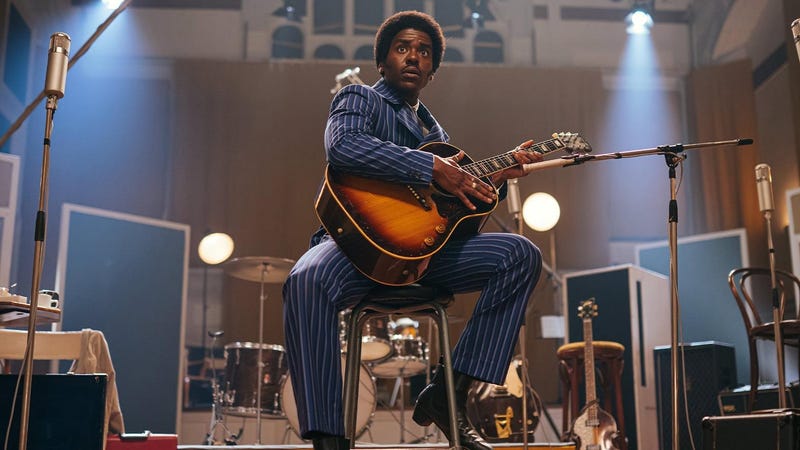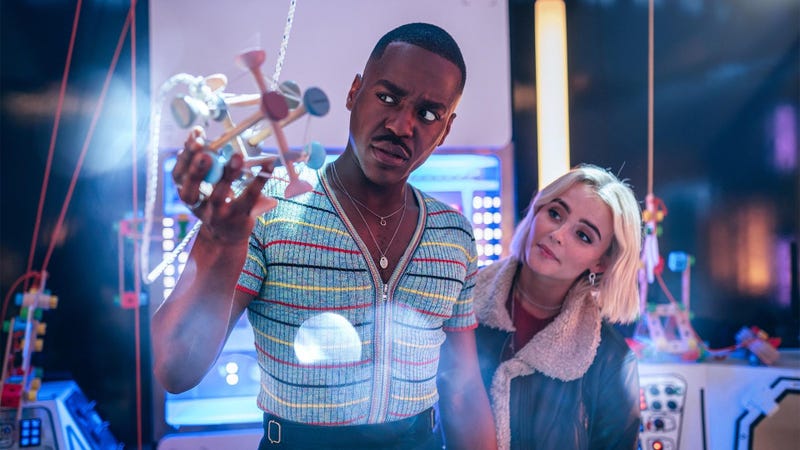When one Doctor biologically passes the torch to another, they do so in fire: a cascading, revitalizing burst of energy that blinds, dazzles, destroys, changes, and births in equal measure. Although Ncuti Gatwa’s Fifteenth Doctor already went through all that—of a sort—late last year for Doctor Who’s 60th anniversary and at Christmas, his debut season feels like the show doing exactly that itself: a rebirth that is bursting at the seems with energy.
The first two episodes of what is now “season one” of Doctor Who once again (not season 14 by 2005 reckonings, and certainly not season 40, going all the way back to 1963)—“Space Babies” and “The Devil’s Chord,” both written by returning showrunner Russell T. Davies—operate in the a traditional format that Davies utilized throughout his previous time on the show. One trip forward in time, one trip back. It’s a way to not just introduce a new companion, in this case Millie Gibson’s Ruby Sunday, to Doctor Who’s inherent premise, but a way to re-center each season to the audience as well from the get-go, in Doctor Who’s purest form, so it can once again show off what it’s capable of. It’s just that this time, it’s got the budget to match, giving it all the slick sheen and dazzle of a show that’s never had a Disney budget before.

What it’s capable of is, in fact, a lot of fun. While there’s certainly threat and menace in both episodes (the latter’s villain, Maestro, played by Jinkx Monsoon, is a pitch-perfect performance of camp audacity and venomous evil in equal measure), the pervasive sense throughout this new dawn for Doctor Who is a sense of unyielding adventure. Even when it’s dark, even when it’s sad, the Doctor and Ruby are bonded by this shared yearning to see more of what’s out there, driven by this connection they feel together, one as the last of their people, the other searching for their birth parents. With fresh eyes for both Time Lord and human alike, their wanderlust is infectious, suffusing Doctor Who with that aforementioned energy, something it feels like it hasn’t always had in recent years.
This infectious charm is no clearer on display in the remarkable spark between Gatwa and Gibson. More often than not practically shrieking their lines at each other with delight, the duo are even better in these two episodes than they were feeling each other out over the course of their first meeting at Christmas in “The Church on Ruby Road”, simmering with a gleeful potential that has the Doctor and Ruby practically pinging about the screen at all times. Even in the quiet moments, the more emotive and demure scenes, that chemistry is electric: the Doctor has had friends before, mates even, as Donna Noble famously misheard the 10th Doctor say. But the Fifteenth Doctor and Ruby have a casualness with each other that makes them effortless feel like equals—not in the sense that Ruby has something to prove to her new alien bestie, but in the sense they are immediately drawn incredibly close as peers that understand each other, and understand what each of them needs out of this shared adventure.

Davies’ scripts likewise match that energy—for better and worse. Both “Space Babies” and “The Devil’s Chord” move at a remarkable clip, and in an effortlessly breezy fashion. While this works highly in the favor of characterizing the Doctor and Ruby’s relationship together, it doesn’t quite always work in terms of presenting a few adventures that challenge the audience to think all that much about what’s actually happening on screen. You barely have time to, between the delectably chaotic storm Gatwa and Gibson wreak, and the stories bouncing from one moment to the next, almost like they’re hoping you don’t try to stop and think about the logistics of what’s going on for too long. It’s in a similar vein to “The Church on Ruby Road,” albeit with without the more explicitly fantastical bent of that story: these are broad episodes for broad audiences, ones that lean a little lighter and perhaps even sillier in tone than usual.
Not all of that lightness particularly works—there’s definitely a few moments in both episodes that feel like they lean a little too hard into camp slapstick, feeling a bit more awkward than they do charming—and that general vibe being the premiere of the season might bristle some Doctor Who fans who want something that leans a little more sci-fi and with a little more bite to it. But it’s also two episodes out of eight this season—and especially with a show that has such variation in genre and tone like Doctor Who, it’s hard to say if this is an indication of the season’s overall tone. Even if it was, on the whole it works more than it doesn’t, especially thanks to Gatwa and Gibson’s charismatic performances: it’s just good to be informed that the show’s not going to necessarily hit you with something more dark and cerebral right out of the gate.

And really, again, isn’t that just like the Doctor’s regenerations have been for six decades now? A bright flash, a chaotic change, a brimming energy that pings about, and takes a little while to settle before they get stuck into the heady business of saving the universe? It’s more fitting that Doctor Who’s latest era hits the ground running in the manner it does—confident enough that it has enough energy to drag us along for the ride too, and get wrapped up in the same sense of adventure that its new heroes share. Time will tell, as it always does on Doctor Who, if the season can keep that energy and charisma even as it slows down, takes a breath, and lets itself think a little more. But what we’re starting with here as a lot of promise: just like that regeneration energy, it’s bursting with a potential that makes us hope that the future will be very bright indeed.
Doctor Who returns globally with a two-episode premiere Friday, May 10, at 7 p.m. ET on Disney+, and will broadcast through the BBC iPlayer at the same time in the UK, at 12 a.m. local time on Saturday, May 11, before broadcasting on BBC One later that day.
Need more entertainment? Pedestrian Television has launched on 9Now where you can cult classic movies like Fright Night, and homegrown content like Eternal Family and Rostered On. Watch all that and more for free, 24/7 on 9Now.
